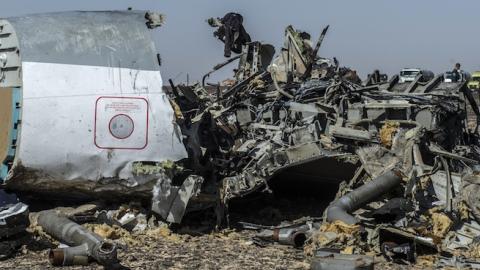Bomb or no bomb? UK flights have started to transport back to Britain some of the 20,000 British tourists who were stranded at the Egyptian resort of Sharm el-Sheikh on the Red Sea after intelligence emerged that the Russian plane that crashed over the Sinai over the weekend was likely brought down by an explosive device. But at the same time, Russia has now stopped all Russian flights bound for Egypt, a sign that the country is increasingly taking seriously the possibility that a bomb caused the crash. That coheres with the U.S. intel; replying to calls for caution from the Egyptian foreign minister about jumping to conclusions, a senior U.S. intelligence official said, “He hasn’t seen the information we have.”
As the belief that a bomb was the cause of the crash grows, and as investigators sift the debris and listen to the black box recordings (and as we think of the families of the victims), it's worth thinking about what the crash could mean for Egypt and the world—because trouble in Egypt could be more consequential than many people understand.
The disruptions to UK travel to the popular resort will be felt in Cairo: 900,000 British tourists travel to Sharm el-Sheikh each year. In addition, Russian tourism—cheap package tours allowing Russians to get away from the gloom of winter—will be heavily affected, and tourism from the rest of the world will be taking a major knock on the head. Tourists shun places where tourists end up getting killed, and Egypt has never needed tourists more than it does now (the tourism industry in Egypt makes up about 11 percent of its GDP, and indirectly employs around 11.5 percent of the country's workforce). And unfortunately for Egypt, international investors shy away from violent, unstable parts of the world.
Egypt does not have a lot of options for economic growth. The region is beset by wars in Libya, Syria and across the Red Sea in Yemen, and Egypt itself is embroiled in the aftermath of the overthrow of the Morsi government, including the harsh crackdown that followed Morsi's fall. And even before the Morsi government fell, Egypt was already wounded by the instability under that government and permanently weakened by the old, corrupt nexus of clientelism and rent-seeking at the heart of Egypt’s political economy. All of that means there is not a lot of give in this fragile system on which millions of people depend.
Moreover, Egypt cannot expect much more help from abroad. The country is almost an afterthought in the West today, where the chief debate is over how much we should indulge our own narcissism by making meaningless and inconsequential gestures of moral disapprobation in the direction of its president and his very tough regime. That's a mistake. The West was wrong to allow itself to be distracted from the much more consequential disaster in Syria by the relatively unimportant crisis in Libya (thereby contributing to the collapse of both countries into misery); it would be just as dangerous now to forget just how important Egypt is to the region—and how fragile the structure of Egypt’s society really is. If anarchy, chaos, widespread unrest, and terrorist ideology surge across Egypt, the resulting problems would dwarf anything we've seen in Syria.
Think, for example, of the migration flows if ordinary Egyptians—and the 8 million Christians among them—became so insecure that they felt the need to flee. Or think of the involvement of world powers seeking stability over the flow of commerce through the Suez Canal, and the panic in the Gulf as one of the remaining pillars of regional order crumbles. In addition, the consequences for Israel if the Sinai’s descent into chaos and jihadi control continues would be huge—as would be the human suffering, the growth in terror, and the impact on world oil prices of inexorably increasing regional disorder. Finally, there is the Humpty Dumpty problem: It would be very difficult to restore order in a country as large as Egypt if a true breakdown comes.
Fortunately, there are forces that hold Egypt together. Its people have a sense of national identity and common culture that most of its post-colonial, hastily stitched together neighbors lack. Bound together by 5,000 years of history and the waters of the Nile, Egyptians have a deep sense of collective identity; the same orientation toward a powerful state that hampers economic development also supports political stability. So Egypt is not fragile in the way that Syria, Lebanon, Jordan, Libya, Iraq and, yes, Iran are fragile.
Even so, it is nowhere written on tablets of stone that Egypt can bear every burden and withstand every blow. As in much of the non-oil rich Middle East, the capacity of the Egyptian state to provide its people with acceptable conditions for life has been diminishing over time. The Muslim Brotherhood network became so powerful in part because state institutions were doing such a terrible job alleviating poverty, promoting educational opportunity, offering decent and affordable health care, and generally providing a safe and favorable environment for daily life. The Brotherhood could win friends by establishing parallel institutions that did what the state could not. But now those institutions have been thoroughly disrupted—and the state’s capacity has not grown.
Western governments, the Americans very much among them, lost a lot of credibility in the Mubarak and Morsi years. In bed with a crooked dictatorship for many years, we dumped the dictator when times got rough—thereby demonstrating to everyone in the region that when you need friends most you can count on the Americans and their Western allies the least. We are still paying for that. We then embraced an illusory "transition to democracy" and spent lots of money and political capital promoting something that did not exist. The liberals we wanted to help failed, as they were doomed to do given their disorganization, lack of experience, and lack of support in popular opinion and culture. We then collaborated with a Muslim Brotherhood government that we neither trusted, understood, nor knew how to help—and as the situation headed out of control we showed ourselves to be clueless. Finally, when their hour of need came, we were as useless for our Muslim Brotherhood "partners" as we had been for Mubarak when his dark hour came.
It was a thoroughly incompetent performance, pretty much from start to finish, and left Egypt under a government that neither likes nor trusts us very much—and over which we do not have a lot of influence, whether on human rights issues or for other purposes.
None of this changes the reality that we need Egypt to succeed (or at least not to fail catastrophically) and that Egypt needs us and our allies if the worst is to be avoided and perhaps a bit of progress to be made. Some of the positive change will have to wait for a change of administration—the arc of failure from President Obama’s soaring hopes and rhetoric in his Cairo speech to the miserable floundering and fumbling of his Administration’s subsequent record is too stark, too striking, and too recent to be fully set to one side. But there are still things that can and should be done now that will support Egypt’s economy, preserve what is left of its civil society, and begin the development of stronger educational, health, and welfare institutions—as well as lay the foundation for better times, in Egypt as a whole and in U.S.-Egyptian relations.
The tragic crash of the Russian airliner should serve as a wake-up call. Egypt matters, and we take it for granted at our peril.














